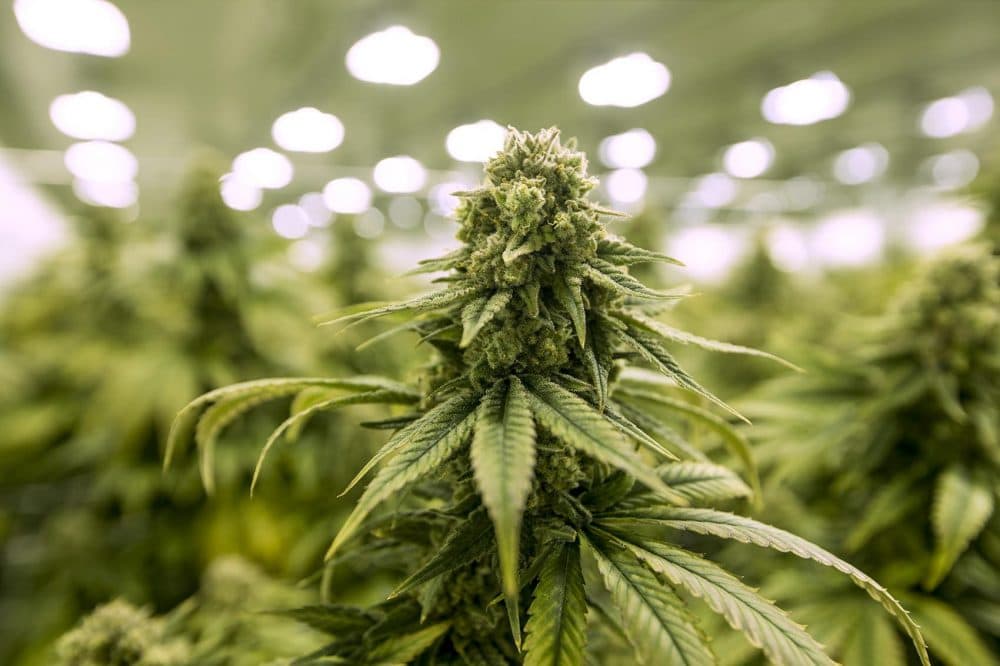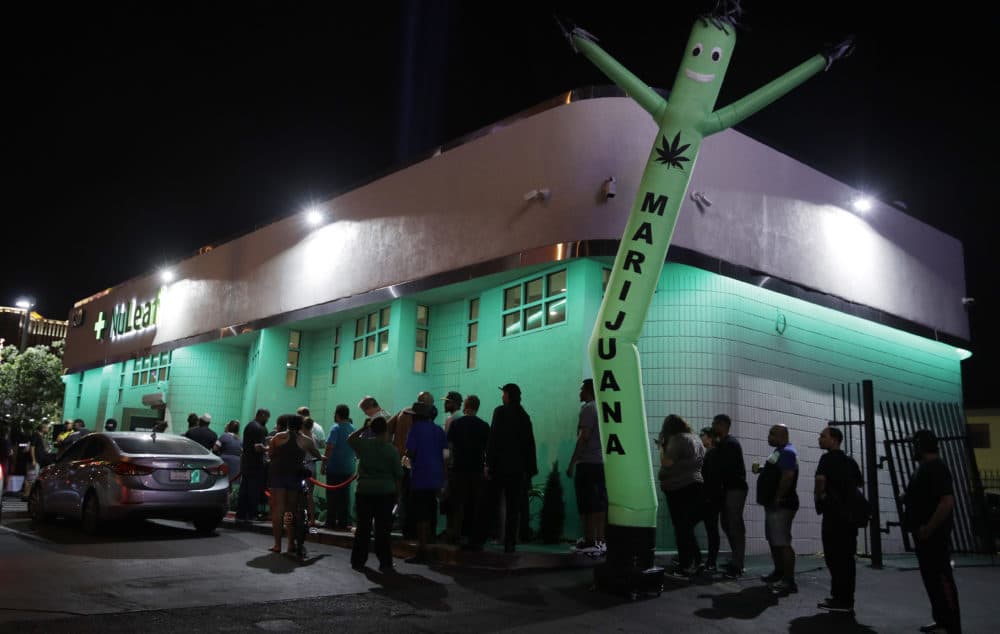Advertisement
It Will Be 'Years' Before Marijuana Cafes Open In Massachusetts, Regulators Say

The days when marijuana users will be able to congregate at an establishment in Massachusetts and socially consume the drug are years away, cannabis regulators said Tuesday, and it is likely that any social consumption will be limited to vaping and edibles.
The Cannabis Control Commission has the authority under the 2016 voter law legalizing adult-use marijuana to license social consumption sites — things like marijuana cafes or marijuana licenses for movie theaters — but regulators have opted to delay that part of the industry while they study how other states and cities are handling it. A final decision is expected by early 2019.
CCC Executive Director Shawn Collins presented the commission with the results of a CCC staff study on social marijuana consumption policies around the country and world. He said that because it is not widely permitted, research on the topic is sparse, "but there are a lot of analogies drawn between alcohol and tobacco."
The Department of Revenue licenses "smoking bars" where patrons can buy and smoke tobacco products, but the definition for those businesses is too narrow to also cover the smoking of marijuana, Collins said.
"While the concept of smoking bars would not be new in Massachusetts, marijuana does not currently fit within the legal definition, therefore, social consumption may be limited to ingestion via electronic vaping and edibles," he told the commission.
Denver uses a "bring your own marijuana" system, in which the city licenses locations where people can vaporize or eat marijuana products they buy elsewhere. Las Vegas is considering a similar model under which it would license hookah-style lounges next to marijuana stores, Collins said, and some California cities allow "tasting rooms" connected to retail shops.

Collins also said that the law Gov. Charlie Baker signed earlier this year raising the minimum age to buy tobacco products from 18 to 21 could complicate social consumption efforts because it "broadens existing prohibitions on public smoking to include e-cigarettes."
If the CCC is going to move forward with social consumption, it is going to need to determine exactly how consumption facilities — whether they allow smoking or not — would fit in with the new provisions of the law, Commissioner Jennifer Flanagan said.
"At some point, I think we're going to have to take a look at that law and see exactly what the ramifications are and what we need to look at going forward," the former state senator said. "Not to say for or against social consumption, it's just to say that we have to be realistic about what's in front of us, legally, here."
Commissioners Shaleen Title and Kay Doyle both argued that while the new tobacco law might be a hurdle down the road, the more immediate problem is that there is no feasible way for a city or town to opt-in and allow social consumption facilities within their borders.
Advertisement
"There is no workable process currently under the law by which a city or town can allow this, and that needs to happen before a facility can open," Title said. "So I would say it's a matter of years and right now there would need to be a change in the legislation before cities and towns can move forward."
Doyle said the problem is a technical issue with the process for a city or town to hold an election at which voters would be asked whether the municipality should allow social consumption establishments.
In a supplemental budget he filed in March, Gov. Charlie Baker proposed a change to the state's marijuana law to spell out a local initiative petition process for towns considering on-premise consumption of marijuana. Baker wrote at the time that the changes were developed in consultation with the CCC staff and that they were intended "to clarify and simplify" the law.
The supplemental budget (H 4284) that included Baker's proposals was not advanced in the Legislature and the statutory changes that would clarify how a city or town would have to go about authorizing social consumption remain in the House Ways and Means Committee, where they were referred in March.
CCC Chairman Steven Hoffman said Tuesday that the commission may formally ask the Legislature for a change to the law to give cities and towns a more clear avenue to authorize social consumption establishments and said that the current legal landscape "should not stop us from doing the work that we need to do so we're in good stead in terms of how we proceed."
The CCC agreed Tuesday to ask Collins and his staff to return to the topic on Oct. 18 with a list of the questions commissioners asked Tuesday and a timeline for when the CCC staff could reasonably expect to have answers for commissioners.
"Twenty percent of the public uses marijuana ... this is not some new scary group of people that's going to start doing some new scary thing. ... In 10 years this is going to be as normal as when you go to the Boston Common and see a movie and you can buy a drink. But it's not happening tomorrow."
Commissioner Shaleen Title
The commission agreed to a proposal from Title, who suggested that the CCC staff begin to work towards assembling a working group of municipal officials interested in opting in to allow social consumption in their cities or towns.
"There will be social consumption, eventually. Twenty percent of the public uses marijuana, they have ways that they use it, this is not some new scary group of people that's going to start doing some new scary thing," Title said, noting that she saw a "ganja yoga" event listed in an events calendar email Tuesday morning. "This is something that's happening ... In 10 years this is going to be as normal as when you go to the Boston Common and see a movie and you can buy a drink. But it's not happening tomorrow."
In February, the CCC acquiesced to criticism from Baker's administration, the Legislature and others when it agreed to delay the launch of home delivery and social consumption, two of the most commonly-condemned parts of the agency's draft regulations.
The CCC's Cannabis Advisory Board had recommended allowing social consumption and suggested that it could reduce the risk of children getting a hold of the drug and may limit how much legal marijuana is illegally transported out of state by tourists. The CAB also suggested that the CCC develop state limits on the "serving size" for social consumption, establish a maximum number of servings allowed per "immediate use package" that cities and towns could adjust, and set a maximum daily exposure limit at which point a budtender could decide to stop serving a consumer.
The CCC in February also agreed that if or when it authorizes delivery and social consumption licenses it will also grant the exclusive rights to those licenses to small businesses, businesses in the CCC's social equity program, craft cooperatives and certain farmers for a period of time in order to mitigate the effects of the delay in licensing.